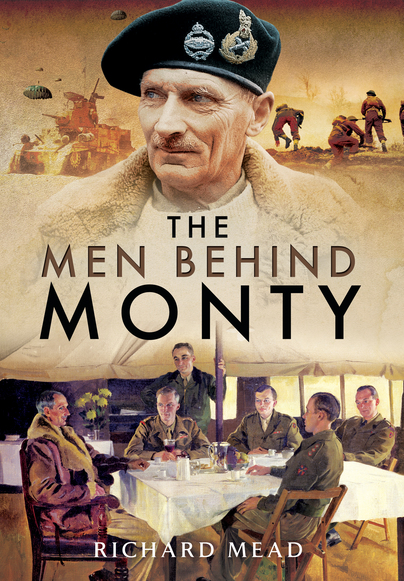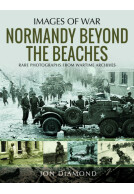The Men Behind Monty (ePub)
Imprint: Pen & Sword Military
File Size: 36.1 MB (.epub)
ISBN: 9781473857520
Published: 28th April 2015
Shortlisted for the...
British Army Military Book of the Year 2016 Award!
The Men Behind Monty examines the role played by the staff in the victorious campaigns of Field Marshal Viscount Montgomery, Britain's most successful field commander since the Duke of Wellington.
When Monty took command of Eighth Army in August 1942, he inherited the staff of his predecessor. He retained all the key members and most of them stayed with him not only from El Alamein to Tunis, but also in Sicily and Italy. When he took command of 21st Army Group in January 1944, many accompanied him to take up the most prominent positions on the HQ staff and the majority remained until the German surrender in May 1945.
This fascinating work focuses not only on the senior officers responsible for the various staff branches, and notably on Monty's outstanding Chief of Staff, Freddie de Guingand, but also on his personal staff, the ADCs and personal liaison officers.
The book sheds light on the work of the staff generally, and on their direct contribution to Monty's decisions, his sometimes difficult and controversial relationships with his superiors and allies.
As featured in.
3945 Magazine
'The author demonstrates his dedication to thorough research and
Firetrench
provides a series of new insights into Monty and his Staff. It is a
nicely paced account and includes some good images in the photo plate
section.'
Read the full review here!
It is nice to see a study of this topic. Monty's Liaison Officers and staff are often mentioned, but rarely in any great detail. Mead avoids the danger of getting distracted by Monty's own personality, although he is of course a dominant figure as the staff existed to serve him, but the focus remains on the staff.
History of War Web
As seen in...
The Military History Group Newsletter
Much has been written about Field Marshall Montgomery, some by his own staff, but not much has been put down about the officers who enabled the successes of Monty. Mead has now done this and has brought us one of the most readable books I have come across for a long time...
Army Rumour Service
The book deals very much with Freddie de Guingand, Monty’s Chief of Staff from his time of arrival in the desert to victory over Germany in 1945. Once Freddie had Monty’s plans and thoughts, he was left to implement them, something that he did brilliantly, ending the war a Major General and with a knighthood. However, Monty could be very harsh to the people who worked with him and very jealous of anyone who might just be taking the shine off his glory, and Mead does not hold back from that. Monty’s strengths are well known and he was a great UK general; however, he had many faults and an ego which was out of control at times. Freddie de Guingand’s job was to smooth the waters after Monty had stirred up the storm, especially with the Americans. This was not always possible...
Much of the book deals with the relationship between the HQs that Monty set up and how he used them. He would stay at his small Tac HQ, close to the front line, and use Liaison Officers (LOs)to maintain contact both forward to Corps and Division plus back to Main HQ. Due to Monty’s rule of the commander never going back Main HQ also used LOs to take back information from Tac HQ in order that the staff officers, and de Guingand in particular, could know and understand what the CinC wanted. These LOs were relatively junior officers but travelled with the full authority of Montgomery and expected to be seen by GOCs of Corps & Divisions in order to get the information they needed. This obviously needed a certain amount of tact from these officers but they pressed for the information where needed and the whole system of LOs was so efficient that Montgomery always had an up to date picture of the battle as it progressed, or otherwise...
This has been one of the most enjoyable books I have read for some time as the writing is well done and flows logically and smoothly covering a huge area that is staff work. Again, like the battles, the book does not go into the minutiae of staff work, but shows what the staff can and did do to bring about victory in Europe. Very much a personal portrait, giving the characters of the main players; how Monty used his young LOs to wind down at dinner in his very small and exclusive Mess showing his sometimes wicked sense of humour. Mead does not miss out on the foibles of Monty’s personality, indeed they form a major part of the work that his staff, especially the Chief of Staff, had to work round and with. I thoroughly enjoyed this book and should anyone have a wish to see how a successful Commander became so because of the support of his Staff then this is the book for you.
This is a very readable account of the headquarters operated by Bernard Montgomery in North Africa, Italy and North-West Europe...This excellent book is one of my 'must reads' of 2015.
War History Online
This book illuminates a lesser-known aspect of the Monty story and of the subject's character. It thus deserves to find a place on the shelves of anyone interested in the military history of the twentieth century, especially that of the British Army. As a study in command and control, it is also valuable with its many lessons for the professional officer. Above all, it is a human story that is both thoroughly research and very well written.
Warfare Magazine
So much has been written about Monty that it would seem that there was neither anything new left to explore nor any fresh way in which to approach this major figure in twentieth-century British history.
Richard Doherty, Irelands leading military history author
Step forward Richard Mead, author of the outstanding biography of Sir Richard McCreery, to demonstrate that there is another avenue along which Monty could be studied: how and with whom Monty staffed his HQs in Eighth Army and 21st Army Group.
The most prominent figure in this study is Freddie de Guingand who served as Monty’s chief of staff from his appointment as commander Eighth Army in August 1942 until the end of the war. As with most of Monty’s staff, de Guingand was devoted to ‘master’ and, indeed, saved Montgomery from himself on more than one occasion.
We learn much of the inner workings of an army and an army group HQ from this book. The scale of an army group HQ is also clear and Monty’s system of operating with a Tac HQ, a Main HQ and a Rear HQ is explained clearly and in detail. A wide range of responsibilities was dealt with at 21st Army Group HQ which broadened as the north-west Europe campaign developed. Not only did the HQ have to deal with such matters as the day-to-say provisioning of two armies on active service, but it also had to deal with the civilian populations of liberated and, later, occupied territories which required a large Civil Affairs branch. Three clear diagrams of the G, Q and A staffs of the army group HQ, and a list of the officers of Tac HQ, are included, with the diagrams indicating just how wide was the range of duties performed.
This book illuminates a lesser-known aspect the Monty story and of the subject’s character. It thus deserves to find a place on the shelves of anyone interested in the military history of the twentieth century, especially that of the British Army. As a study in command and control, it is also valuable with its many lessons for the professional officer. Above all, it is a human story that is both thoroughly researched and very well written.
This is an excellent book and thoroughly well researched. It will be enjoyed by anyone who is interested in the huge influence of the human dimension and relationships in war. Monty’s successes could not have been possible without the loyal support of his staff officers, and the challenges they faced were considerable. Monty was not an easy man, a strange mix of emotions that ranged from familiarity, kindness, arrogance, thoughtlessness, and probably loneliness. It would be interesting to know whether the author agrees with Anthony Beevor who has recently claimed that Monty suffered from Asperger’s disease. Either way, Monty was well served by those officers around him, including a good number from the Household Division.
The Guards Magazine
This is a story behind a story, one which has been touched on in many other histories and biographies, but has never been brought together as a whole.
Cirencester Scene Magazine
This is a story behind a story, one of which has been touched upon in many other histories and biographies but has never before been brought together as a whole.
Wilts and Gloucestershire Standard
- Author Interview on BBC Radio
About Richard Mead
Richard Mead was educated at Marlborough College and Pembroke College, Cambridge. He has written General ‘Boy’: The Life of Lieutenant General Sir Frederick Browning and The Last Great Cavalryman: The Life of General Sir Richard McCreery, Commander Eighty Army, The Men Behind Monty, Commando General – The Life of Sir Robert Laycock and Sam - The Life of MRAF Lord Elworthy all in print with Pen and Sword Books. Richard and his wife live in Gloucestershire and he has two grown-up sons.




















